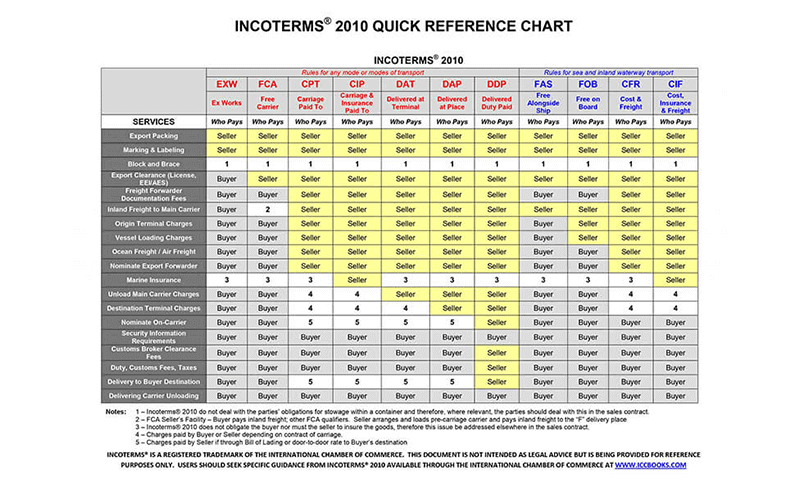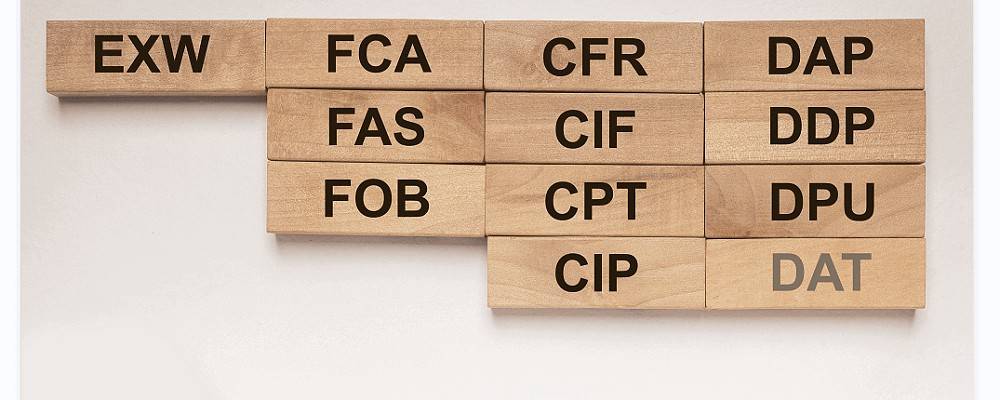2023-01-13
Incoterms are the rules that define the terms of trade for the sale of goods around the world. Entering the world of global trade and shipping means understanding your role and responsibilities in importing and exporting goods - and that requires an understanding of Incoterms in logistics.
Incoterms in Logistics are rules developed by the International Chamber of Commerce that define the terms of trade under which goods are sold around the world. You can think of them as the common language of trade - by understanding them better, you will be better able to import and export goods with parties around the world.
Whether you are dealing with bills of lading, creating packing lists for shipments, customs invoices or commercial invoices; or preparing certificates of origin at the port - Incoterms support you all the way.
✅ What Incoterms in logistics cover
❌ What Incoterms in Logistics do not cover
The following Incoterms reference chart is for reference only

There are 11 Incoterms in logistics, but the most commonly used are
FOB (Free on Board) FOB shipping means that the seller delivers the goods to the buyer's designated ship at the designated port of shipment. Until then, they are responsible for all costs. Once the goods are on board, the buyer will bear the risk and costs.
EXW (Ex Works) Ex Works means that the seller places the goods at the seller's premises or other designated place (i.e. factory, plant, warehouse, etc.)
DDP (Delivery Duty Paid) DDP Incoterms - "Delivered Duty Paid" - means that the seller assumes all costs and risks involved in delivering the goods to their destination and is obligated not only to clear the goods for export and import, pay any import and export duties and perform all customs formalities.
FCA (Free Carrier) Free Carrier means that the seller delivers the goods to the carrier or other person designated by the buyer at the seller's premises or other designated place. Under the FCA shipping terms, it is recommended that both parties specify as clearly as possible the location within the named place of delivery, as the risk passes to the buyer at that point.
CIF (Cost, Insurance and Freight) Using the CIF Incoterms, the seller delivers the goods cleared for export to the ship in the shipping tank. He also pays the cost of transporting the goods to the port of destination. In addition, the seller enters into an insurance contract that covers the buyer against the risk of loss or damage to the goods during transportation.
DAP (Delivery in Place) The term DAP in transport means that the seller delivers the goods when they are placed at the disposal of the buyer on the arriving means of transport, ready for unloading at the named destination. After this point the seller assumes all risk of transporting the goods to the named place.
Please note: At JIKEship, we do not offer all Incoterms on a global basis. For example, most countries do not offer EXW and DDP. if you would like to know which Incoterms are available in your region, please contact us.

Entering global trade means that your responsibilities involve importing and exporting goods - which requires an understanding of Incoterms in logistics.
2023-01-13
We use third-party cookies in order to personalise your experience.
Read our cookie policy